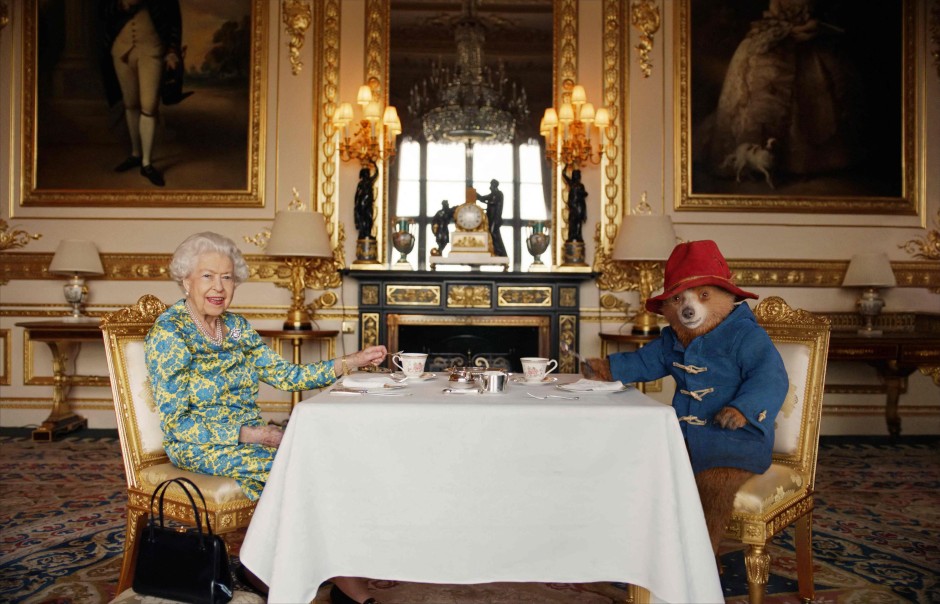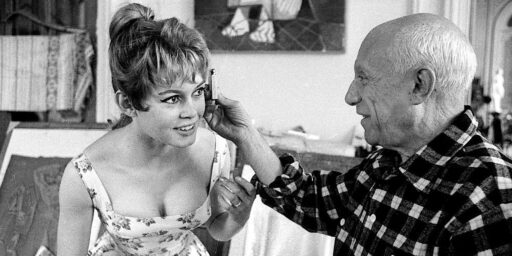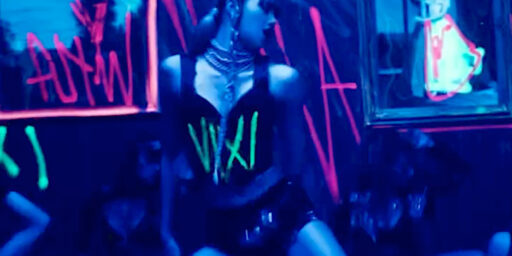God Save The Queen ゴッド・セイヴ・ザ・クイーン
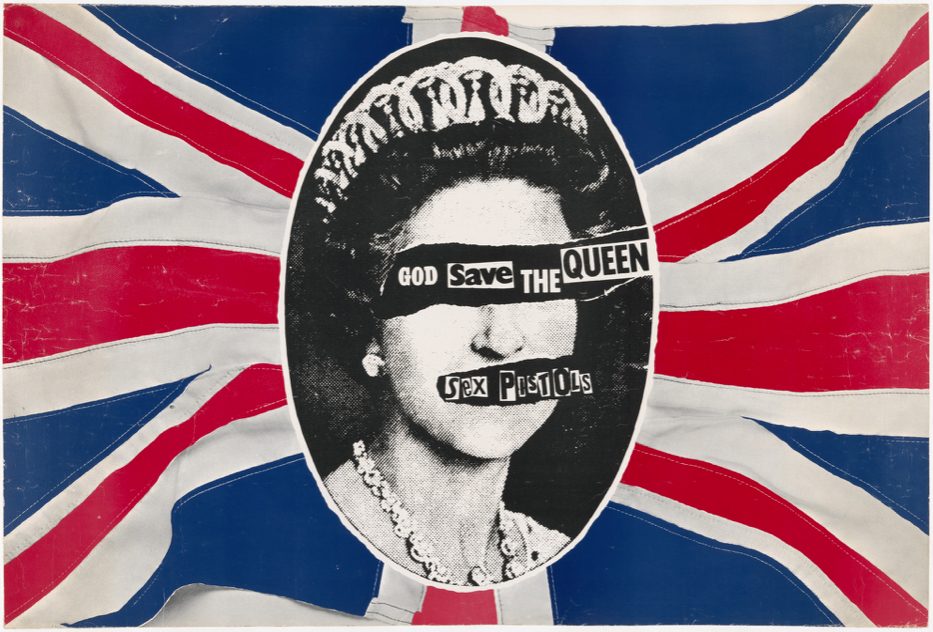

Sex Pistols: God Save The Queen (1977)
God save the Queen
The [her] fascist regime
They made you a moron
[A] Potential H-bomb
God save the Queen
She ain’t no human being
There is no future
In England’s dreaming
Don’t be told about what you want
Don’t be told about what you need
There’s no future, no future, no future for you
God save the Queen
We mean it, man
We love our Queen
God saves
God save the Queen
‘Cause tourists are money
And our figurehead
Is not what she seems
Oh God, save history
God save your mad parade
Oh Lord God, have mercy!
All crimes are paid
When there’s no future, how can there be sin?
We’re the flowers in the dustbin
We’re the poison in the human machine
We’re the future, your future
God save the Queen
We mean it, man
We love our Queen
God saves
God save the Queen
We mean it, man
There is no future
In England’s dreaming
No future, no future
No future, no future
No future for you
No future, no future
No future, no future
No future for you
No future, no future
No future, no future
No future for you
No future, no future,
No future for you
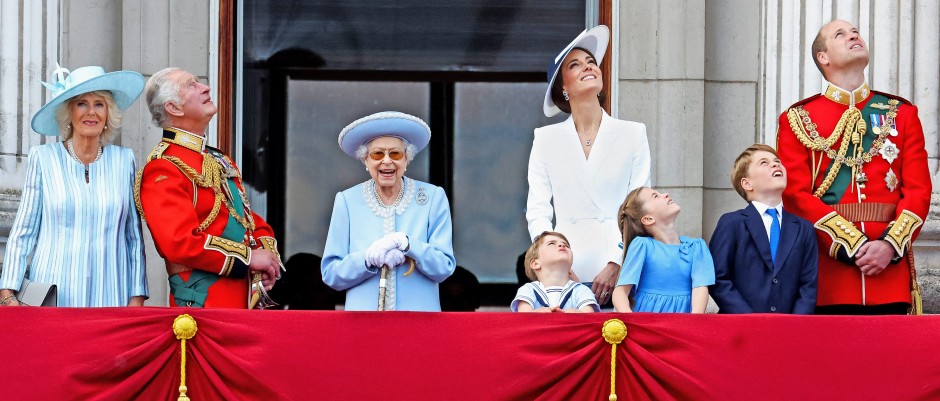
The punk band “Sex Pistols” serenaded Elizabeth II on her silver jubilee, but the BBC didn’t like it. It was banned from the radio – “God Save The Queen” became a classic.
On June 7, 1977, Malcolm McLaren and Vivienne Westwood chartered a boat named “Queen Elizabeth” in London – supposedly to take a German synthesizer band for a ride, because otherwise the captain probably wouldn’t have let them on board in the first place. In fact, however, he sailed the punk band “Sex Pistols” imagined by both of them, along with their audience, past Battersea Power Station in the direction of Westminster. From the boat, the band serenaded the Queen with a song that bore the same title as the British national anthem, but that was it for the similarities. There was no talk of a gracious head of state who was as victorious and glorious as possible (a highly anachronistic text, by the way, with regard to the Queen’s political function), but of the disastrous effects of those institutions of British society of which she was the figurehead.
John Lydon’s verses did not engage in the kind of nostalgic retrospection that characterized the 1977 Jubilee on every corner – from the Commonwealth Tour to mugs, street parties and the “Trooping of the Colours” parade. The collage-like lyrics instead describe a grim vision of the future in which the idea of “England” fails and everything degenerates into a “mad parade” in which the only thing left to do is beg God for mercy – in the mode of irony.
“God Save The Queen” was sung by Lydon as a syncopated dynamic counterpart to the sustained hymn melody with lusty sarcasm (“We mean it man!”). With an exaggeratedly rolled R, he pointed out the consequences of a system that made fools of everyone and in which the monarchy was nothing more than a tourist attraction – an argument with which the public expenditure on the royal family is thoroughly legitimized to this day. What the BBC and other British institutions saw as an attack on the queen was in fact a critique of British class society, which offered no future to the younger generation.
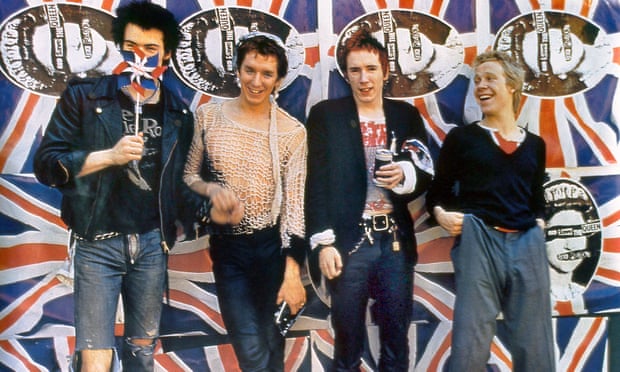
A Means of Subversion
In one respect, the text even corresponded to monarchical doctrine: “She ain’t no human being” was aptly said, since the anointing of the queen during the coronation ceremony brought her close to the divine and emphasized the divine nature of her reign. Incidentally, the BBC had also censored this moment during the live broadcast of the coronation in 1953: The screen went black as the queen received sacred ordinations from the Archbishop of Canterbury under a canopy.
Out-of-time rituals like these, however, were part of the problem (“Oh God, save history”), leaving the younger generation with little choice but “No future.” In 1975, fifteen percent of the British population was between the ages of thirteen and twenty-one. Of these eight million young people, two-thirds were working class, and two million were receiving the British version of unemployment benefits, which barely covered living expenses. Many of them had not finished school, there were ten school leavers for every job, and there was no future in sight. At least the youth should no longer be lectured about what they want and what they need, Lydon sang. The refrain is as clear as it is paradoxical, since the invocation of “No future” also implies that things should actually be different.
John Lydon was also living on unemployment benefits when Malcolm McLaren and Vivienne Westwood discovered him as the frontman of the Sex Pistols. Lydon, who adopted the eloquent stage name Johnny Rotten, saw himself explicitly as a mouthpiece for young people from the working class. McLaren, however, quite naively saw the Sex Pistols as a means of subversion. He wanted to apply the Situationist method of provocation to commercialized music culture and get a band on one of the major record labels, as historian David Simonelli describes in the journal British Contemporary History in 2010. Punk, with its offensive language, disillusioned perception of the present and future, and refusal to accept social conventions, was ideally suited to deliver these provocations. And the Sex Pistols delivered.
The constant scandalizing of the band in the media, the desire for censorship and the resulting record deals and their breakup created an attention hype that PR managers still dream of today. After EMI and A&M Records first signed the band and then kicked them out the door, the Sex Pistols were each allowed to keep their advances. Within a few months, they had made 115,000 pounds on that alone, even though they had released only one single to date, “Anarchy in the UK.” Simonelli remarked somewhat smugly that McLaren’s situationist project seemed to have earned its keep.
The second record label, A&M Records, initially tried to add fuel to the scandal surrounding “God Save The Queen” by having the band sign the record deal right outside Buckingham Palace. But after only a week, the label parted ways with the band. “God Save The Queen” was finally released by Virgin Records. For the record cover, designer Jamie Reid hacked up the official portrait by court photographer Cecil Beaton; he pasted over the Queen’s eyes and mouth with band names and song titles or pulled a safety pin through the sitter’s lips. Reid’s works are now in museums and part of the “Theater and Performance” collection of the Victoria and Albert Museum in London.
The biggest favor, however, was probably done to the band by the BBC. As early as 1976, it had banned the group from its television broadcasts; “God Save The Queen” was not even played by the station, which had only become accustomed to rock music with difficulty in the 1960s, and many other radio stations followed this example. Nevertheless, the song landed at number 2 in the charts, 150,000 copies were sold within five days, and Virgin Records rumored that it was actually number 1.
The handling of British media seems naive in retrospect, the constant warnings about these anarchistic fiends only made them all the more attractive to young people. But hardly at the height of their fame, the band at the end of the year 1977 already made dissolution tendencies noticeable. 1978 came the end for the Sex Pistols, only occasionally they tour since the 1990s in largely original line-up.
For this year’s Queen’s Jubilee, the single has been reissued in vinyl (as it was for the anniversaries in 2002 and 2012). In addition, the line “No future” is more concrete for many young people in 2022 in view of climate change than it was in 1977, when the hopelessness “only” referred to British society, not to the future of the globe.
“No future for you” is what the Johnson government is shouting at the BBC, which is now considered left-wing, and wants to cut its license fees. The future of the sung about, on the other hand, the anointed Queen Elizabeth II, continues to show little room for maneuver. She cannot actually resign – son Charles would not be allowed to call himself king but merely regent until her death. “She ain’t no human being,” how right the Sex Pistols were.
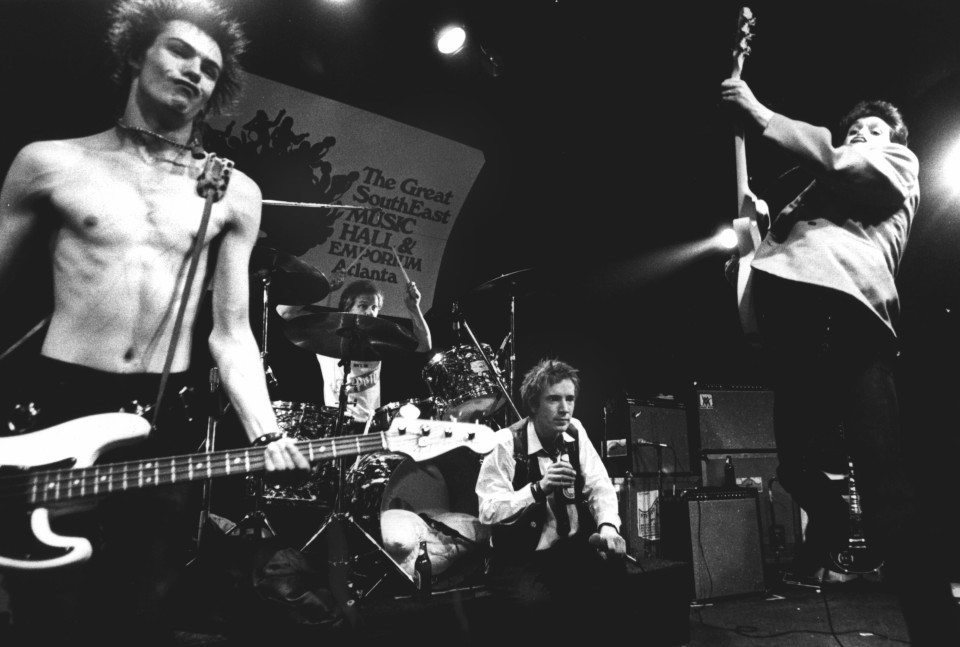
Foulkes & Sons Jubilee celebrations
As a tribute to Her Majesty Queen Elizabeth II Foulkes and Sons repair to the parklands of the ancestral hovel and stage whatever the ancestral hovel’s answer to a street party is called to taste one of my favourites: the Punch Royal Selection No 11.
Look out for Batista’s souvenir Dunhill Coronation table lighter
The cigar is superb and transports us to the highest realms of delight and while in those altitudinous realms we ponder other examples of the torcedor’s art with royal nomenclature and speculate on doing a series of broadcasts devoted to cigars named after political figures: Clemenceau, Churchill etc
We discuss major constitutional issues namely the monarch’s fondness for the oeuvre of Grace Jones and watching A Bug’s Life. I recall how Bruno at Mark’s Club used to bring flowers from his garden to decorate the Queen Mother’s table if she happened to be coming in for lunch.
A lot of other nonsense of quite staggering inconsequentiality is talked
God Save the Queen
https://www.instagram.com/p/CeHk2BXFD1f/
up-date 2022/6/5
Ma’amalade sandwich Your Majesty?
